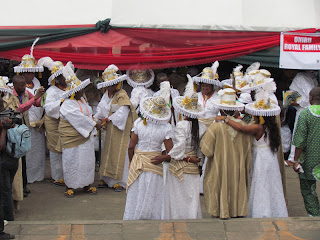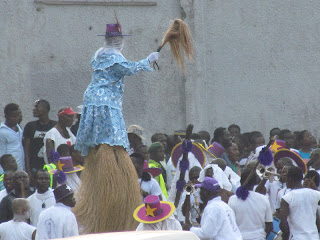Before I left Lagos for Christmas, I visited a new facility that serves the needs of kids that live on the street. The Child Life Line Reception Center at Gbagada is a drop-in day center for street kids. They have another center in Ibeshe, near Ikorodu, that is residential for street boys, which has been in existence for a number of years. This new facility, just opened a year ago February, gives street kids (boys and girls on alternate days) a place to come during the day.
They wash their clothes and have a place to clean up, sleep in the morning (since they can't sleep much on the streets at night) and have some classes or training on life skills or literacy and they get a free meal. The center is just open from 7 AM to 4 PM, so at 4 they go out to their life on the streets -- most have some kind of jobs. Some boys work as a bus conductor, for example. Child Life line's staff of social workers try to get kids reunited with their families wherever possible, or to get some that are willing into residential centers that have openings. Some of the kids are fine with living on the street and don't want another life, but this center gives them a quiet, secure place to spend part of their day.
The children that use the center vary each day. They tend to have around 15 kids there each day, but it varies widely. They separate the sexes they allow in each day, as there were a multitude of problems that arose when they were there together. ;o) But occasionally when something special is going on, they allow both boys and girls to come use the facilities on a certain day, and attendance always goes way up that day. The staff track the attendance of the kids, but can do nothing but make the facilities more useful or appealing to encourage the kids to come there.
This is the kitchen where the cook fixes lunch each day. There isn't much working equipment here, but getting a free meal is a real plus for these kids.
They wash their clothes and have a place to clean up, sleep in the morning (since they can't sleep much on the streets at night) and have some classes or training on life skills or literacy and they get a free meal. The center is just open from 7 AM to 4 PM, so at 4 they go out to their life on the streets -- most have some kind of jobs. Some boys work as a bus conductor, for example. Child Life line's staff of social workers try to get kids reunited with their families wherever possible, or to get some that are willing into residential centers that have openings. Some of the kids are fine with living on the street and don't want another life, but this center gives them a quiet, secure place to spend part of their day.
These boys had been awakened from their morning sleep to greet us.
They sleep on mats in this room.
Laundry draped on the wall to dry. The Reception Center is trying to organize locker storage space so each of the regular attendees can keep a spare set of clothes at the center so they can wear that set while they wash the clothes they came in wearing.
The children that use the center vary each day. They tend to have around 15 kids there each day, but it varies widely. They separate the sexes they allow in each day, as there were a multitude of problems that arose when they were there together. ;o) But occasionally when something special is going on, they allow both boys and girls to come use the facilities on a certain day, and attendance always goes way up that day. The staff track the attendance of the kids, but can do nothing but make the facilities more useful or appealing to encourage the kids to come there.
This is the kitchen where the cook fixes lunch each day. There isn't much working equipment here, but getting a free meal is a real plus for these kids.
Below is the bathroom building. Getting another one built is a priority for the Center and I'm working on some angles trying to help them get funding for this. The kids line up to use the one toilet and shower each morning. They have plans for another building next to this one that will have two toilets and two showers. It is really needed!
The shower looks like it's almost in the toilet....
I'm sure having the foosball and ping pong games are a real draw for the boys. The concrete tanks in the background are fish tanks. They have similar ones at the Residential Child Life Line Center. The tanks had recently been stocked with small fish and they will be great to use for their meals when they get bigger.
The boys we met seemed to be quite happy having a quiet and safe place to stay during the day.
Living on the street is sometimes appealing to children who have left home to get away from rules. For a time, many enjoy having a job that brings them in a dollar or so a day and the freedom to do as they please. Some street children have been thrown out of their homes for various reasons. Whatever reason they are on the street, I know that it is a good thing that they have a safe and quiet place to spend part of their day.










































































